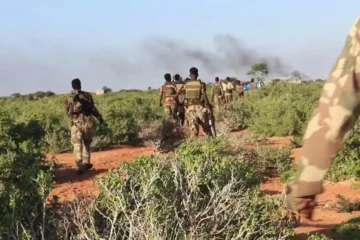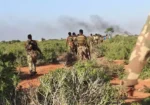‘Enough is Enough’: Somali local clans’ revolt against Al-Shabaab

An armed elderly man in the ranks of the Macawiisley. Source: SNTV
Al-Shabaab is on the back foot. A string of coordinated operations between the Somali government forces and armed local clans, commonly known as Macawiisley, has caught Africa’s deadliest terrorist group by surprise. So effective have the operations been that many towns and villages that have been under Al-Shabaab rule since the group’s inception have been liberated.
Footages of fed-up community members, young and old, taking up arms to hunt terrorist elements have been shared widely on social media. The operations have received overwhelming support from Somalis who see them as signaling the beginning of the end for Al-Shabaab.
Scores of Al-Shabaab militants have been killed so far and dozens of villages and towns have been liberated mainly in Hirshabelle state, according to government sources.
General Mohamed Tahlil Bihi, the infantry commander of the SNA, announced to the media on Wednesday the reopening of the road linking two cities in the Hiiraan region of Hirshabelle state, Buloburde and Beldeweyne, and hailed the residents for their cooperation with the government in the fight against Al-Shabaab militants.
“Al-Shabaab terrorists are now running for their lives in a chaotic manner,” he told reporters, urging other local communities in Al-Shabaab-controlled areas to revolt against the extremist group.
This is the largest operation against Al-Shabaab in a decade.
Government support for Macawiisley
The Macawiisley is a clan militia that was formed in 2014 by locals in the Hiiraan region to defend themselves from Al-Shabaab oppression, excessive taxation, and forced recruitment of children as fighters. Derived from the word Macawiis – a traditional lower garment typically by Somali men – Macawiisley loosely translates to Somali male pastoralists or “villagers”.
Recent weeks have seen fresh rounds of fighting between Macawiisley and Al-Shabaab militants amid a looming famine in Somalia.
Keen to uphold its promise of liberating Somalia from Al-Shabaab, the administration of President Hassan Sheikh Mohamud has been swift to back the community-created militia by deploying the SNA to fight alongside them while assisting them with ammunition and other logistics.
The government, in cooperation with senior politicians and clan elders, has also sought to widen the Macawiisley insurrection by encouraging clans in Galmudug and Southwest states to follow suit.
In recent remarks to Somali Signal, Kamal Gutale, senior security advisor to Prime Minister Hamza Abdi Barre, confirmed the government is backing the Macawiisley but denied that it was supplying them with arms and weapons noting that the militia is already armed.
However, the SNA is already fighting alongside the militias and analysts believe it is providing them with the necessary ammunition.
For his part, President Mohamud is understood to be lobbying for financial, military, and logistical support from key international partners such as the US to support it in the fight against Al-Shabaab.
Speaking at the Washington-based Center for Strategic and International Studies (CSIS) during his visit to the US last week, the Somali leader hailed local communities for helping the government liberate Somali towns and villages from Al-Shabaab.
“The community now is fed up and they say, enough is enough, go,” Mohamud said in his speech.
He added, “There are conferences that are going to come right now in certain geographic locations in Somalia where clans are declaring that guys [Al-Shabaab], you leave us, or we’ll fight.”
Possible risks
Despite the immense euphoria in Somalia surrounding the military gains made against Al-Shabaab thus far, there are several long-term risks associated with supporting clan militias.
Somalia’s civil war history has created suspicion and grievances among clans, especially those sharing localities and resources. Cognizant of this, Al-Shabaab has long exploited these animosities to get the support of certain aggrieved clans, particularly those who felt less represented in the government.
Recently, Somalia’s Deputy Minister of Information, Abdirahman Yusuf Al-adala, warned that Al-Shabaab has started to sow hatred and animosity among the Somali communities to pit them against each other.
In a recent propaganda video, Al-Shabaab spokesman Ali Dheere threatened clans that support the government in the fight against the group.
“Any tribe or clan that assists the disbelievers [Somali government], opposes Sharia law, … and fight against the Mujahideen … we vow to fight against them … until they adhere to the Sharia,” Ali Dheere told a batch of new Al-Shabaab fighters at a graduation ceremony.
Al-Shabaab is clearly feeling the pain of this revolt. Its threats to carry out retaliatory attacks on government buildings prove it.
Hence, it will not be a surprise if Al-Shabaab resorts to supporting certain clans that might feel threatened by the Macawiisley. One way the government can avoid such a scenario is to ensure that all clans are on board in the fight against Al-Shabaab to spare the country another civil war in the future.
Another concern is that the increasing power of the Macawiisley militia will encourage them to make political demands, akin to what the Sufi militia Ahlu Sunnah Wal Jamaa has been doing in Galmudug state.
On the other hand, the lack of a clear hierarchy or chain of command among these militias could foster predatory behavior among its recruits who might exploit their newly acquired power to engage in looting, revenge acts, and other criminal activities in the future.
The government, therefore, should develop a plan to professionalize and integrate the Macawiisley fighters, particularly the young among them, into the SNA.
The lesser evil
Despite the risks associated with supporting community-sponsored militias, the government could be seeing this strategy as a lesser evil than Al-Shabaab. This is because while clans may have grievances and political demands that can be addressed with time, Al-Shabaab is an organization based on ideology – and an ideology can only be overcome if its adherents denounce it and are rehabilitated.
To minimize the possible repercussions of such a strategy, the government has been sending some of its top officials and other senior politicians to engage closely with members of their constituencies to ensure them the support of the government. This is key in securing the loyalty of these clans.
The government is also not providing new arms to the Macawiisley. Many Somali clans in rural areas are already armed and the government is only providing them with ammunition to minimize the risks related to arming clan militias.
It is also important to note that so far, the Macawiisley have been sponsored locally and have no external patrons who can use them for their own strategic goals. This makes it easier for the government to supervise and mentor the Macawiisley militias who are largely motivated by providing security to their respective communities.
In sum, the government is currently having an upper hand in its war against Al-Shabaab thanks to its ability to mobilize and support local communities in revolting against the group’s rule. While useful, the strategy is not sustainable and may present long-term risks.
Meanwhile, the SNA ranks should be bolstered not only to make fresh offensives but also to take over the control of liberated towns and villages and consolidate the military gains made thus far.








